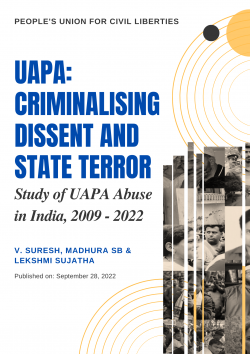UAPA: Criminalising Dissent And State Terror. Study of UAPA Abuse in India, 2009-2022

The Indian state has a vast arsenal of anti-terror, criminal laws in its armoury with which it
can quell, contain and counter any activity it deems to be ‘terrorist’ acts which threatens the
unity, integrity, security (including economic security), or sovereignty of India. From the
colonial era provisions like Sec. 121-A (waging war against India) and Sec. 124-A (Sedition)
of the Indian Penal Code, 1860 (IPC), it has armed itself with more specialised laws like the
Armed Forces Special Powers Act, 1958 (AFSPA), the Unlawful Activities Prevention Act,
1967 (UAPA) 1 and the National Security Act, 1980 (NSA).
These laws gave the state wide, unbridled and unregulated powers of arrest and
incarceration without charge for long periods and denial of procedural rights like bail among
others. They also legitimized the departures from ordinary criminal law including changing
essential rules of evidence like the principle of adverse inference or presumption of guilt or
revealing identity of witnesses and other checks and balances, evolved through many decades
of development of ordinary criminal law.
Apart from the central laws, many individual states have passed their own security laws
which give it even more stringent powers like the Jammu & Kashmir Public Safety Act, 1978
and the Chhattisgarh Special Public Safety Act, 2005. Another set of laws were passed
ostensibly to control organised crime like the Maharashtra Control of Organised Crimes Act,
1999 (MCOCA) which soon saw various clones in different states like the Karnataka Control
of Organised Crimes Act and the Gujarat Control of Organised Crimes Act, 2003
(GUJCOCA)2. The common dimension in all these laws was the wide powers it gave the state
police accompanied by loose definitions of offences and draconian procedural provisions.
Related Issue
Law and Judiciary, Constitutional Remedies, Right to Freedom of Expression
Tags
UAPA, Terror Laws, Prisoners, Incarceration, Human Rights Defenders, Human Rights, Right to Dissent